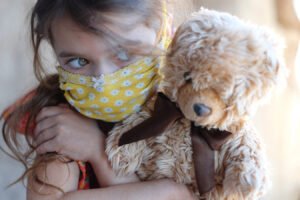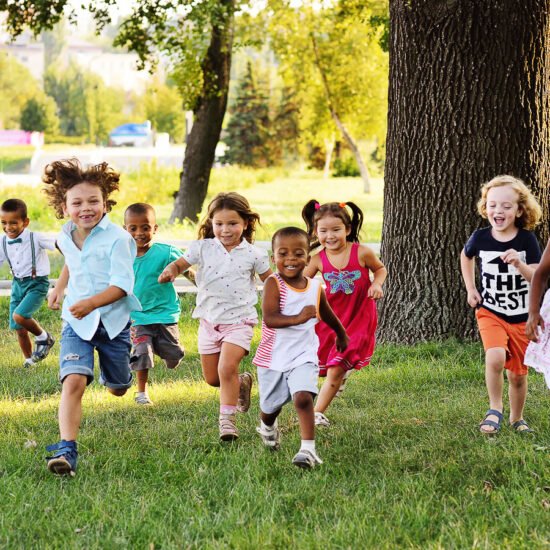The impact of the pandemic on children’s behaviour
Recognise the impact of the pandemic on children’s behaviour and learn what you can do to minimise the impact of new routines on children
Covid-19

The COVID-19 pandemic has brought important challenges to society and families, with an impact on child behaviour and development, an impact whose dimension we do not yet fully know.
The effects on children’s mental health derive from several factors: from concerns about the disease itself and uncertainties about contagion and lethality, to the measures instituted to minimise its impacts, such as isolation and social distancing.
At the beginning of the pandemic, daycare centres and schools closed overnight, forcing the interruption of children’s interaction with each other and with educators, and forcing them to abruptly adjust to the new rules and realities.
We know that physical contact and socialisation are fundamental to the well-being of every human being, but children are particularly vulnerable because harmful changes in the environment can negatively condition their social, cognitive, and emotional development.
EFFECTS OF COVID-19 ON CHILDREN
The impact of COVID-19 on children’s health has been worrying experts and society.
A study conducted in China in February 2020 assessed the immediate effects of the pandemic on the psychological development of children and adolescents. The most frequent emotional and behavioural problems were: The most common emotional and behavioral problems were:
- inability to concentrate
- irritability
- fear that family members would be contaminated
- excessive dependence on family members
In addition, there have been cases of:
- sleep disturbance and nightmares
- decreased appetite
- physical symptoms
- agitation
The consequences of the pandemic can be even more worrying when the children suffer from mental and developmental diseases. Sudden changes in daily routine have consequences and can potentiate existing symptoms, increasing the risk of emotional, behavioural, and relationship complications.
Staying at home and limiting outdoor activities may aggravate the agitation and impulsivity characteristics of children with Attention Deficit Hyperactivity Disorder. In the case of Autism Spectrum Disorder, social isolation can lead to an increased risk of disruptive behaviours and difficulty in relationships with peers.
Children with special educational needs may need additional support to adapt to new routines and to understand changes. The most susceptible youths may develop symptoms of anxiety, depression, and in some cases, obsessive-compulsive behaviours related to hygiene and disinfection.
EFFECTS OF THE PANDEMIC ON FAMILY LIFE
A stable family environment is essential for children to create positive models and grow harmoniously, in an environment favourable to affection and understanding. It is important to remember that, in addition to individual impacts, the pandemic can cause or accentuate disturbances in family life and in the mental health of parents and caregivers, indirectly conditioning the healthy development of children.
In many cases, during the period of lockdown, family members were forced to share the same space in an exhaustive way, combining domestic, professional, and child support tasks, a reality that increased family conflicts and neglect.
The possible increase in cases of domestic violence can impair the development of the brain in childhood from very early on and, in the long term, cause a so-called toxic stress that evolves into behavioural problems, anxiety, and depression.
Many children are being deprived of the closest contact with the extended family, namely with grandparents who, in these times, are fundamental in the daily lives of families and are present in the care and education of grandchildren. The fear of transmitting the disease to risk groups led to the withdrawal, negatively conditioning these relationships that are usually so healthy, with a psychological impact for both parties.
In the context of family problems, there is also the impact that the pandemic is having on the economy of families. The financial difficulties caused by unemployment and loss of income can increase disturbances in family relationships, and children are again more vulnerable.
EFFECTS OF THE NEW CORONAVIRUS ON EDUCATION AND SOCIAL RELATIONS
Just like the family, schools play a crucial role in learning and growth. It is at school and in their interactions that the child frees themselves from the family, learns more about themselves and the world, and recognises new ideas and new ways of behaving. This process is pivotal for the cognitive and social development of each citizen. It is in school that children and young people are confronted with adverse situations, being forced to seek solutions and develop adaptation skills. The school also helps to detect early cases of violence or family neglect, collaborating in the protection of the young ones.
The closure of schools caused serious pedagogical damage, despite all the efforts that were made to ensuring that learning continued even at a distance.
Younger children need more concrete and interactive experiences to consolidate knowledge and online classes are often not enough.
The pandemic showed social inequalities. The poorer children are most disadvantaged because they have less access to technology, information, and adult supervision.
Finally, children with learning disabilities, who need differentiated support and greater involvement from schools and families, may be more affected.
Spending time with peers, particularly without adult supervision, is essential for children’s well-being. Since the beginning of the pandemic and even now, back at school, social relationships, sharing, physical contact, and peer play have been limited. The pandemic forced the closure of playgrounds and reduced the number of parties and usual social opportunities. Young people will spend less time performing recreational activities such as sports, arts and music, enhancing feelings of loneliness and isolation.
Lockdown led people to find other ways to relate to each other. Many children and adolescents kept in contact with each other through social networks and the internet. While there are benefits of technologies in bringing people closer, excessive screen time, internet-related dangers, and cyberbullying can lead to diverse problems in the physical and mental health of younger people.
WHAT CAN BE DONE TO MINIMISE THE IMPACT OF THE PANDEMIC ON CHILDREN’S DEVELOPMENT?
Affection: Showing care and sensitivity to the child’s expressions helps build an environment in which the little ones feel accepted and protected. Understand that in very tense situations, the child may reveal different behaviours than their usual ones. Tantrums, agitation, or neediness are not a challenge to the adult but rather a response to this experience, and it is essential to help them understand this relationship and reassure them. Never underestimate reactions of fear or anxiety. Always praise good attitudes.
Communication: Clarifying the child’s doubts is essential. Try to spend quality time with them, establishing a dialogue based on truth, respecting their maturity and understanding. Let the child speak and express themselves about what is worrying them.
Play: Playtime and games are ways for the child to organise and make sense of the world. Create a routine at home that allows you to strengthen family ties. Reading, drawing, board games, playing games, and helping with household chores are some possible activities. Encourage physical and outdoor activities. Allow the child to maintain loving ties with friends and family, always in accordance with safety standards, through, for example, virtual means.
NEW REALITY AT A TIME OF PANDEMIC
With the opening back up of schools and the return to routines, it is essential to create a balance between the public health measures necessary to minimise the impact of the pandemic and the gradual return of interpersonal relations and school, professional, and leisure activities.
Parents play a key role in preventing children from living in a climate of fear, insecurity, social phobia, and emotional distancing.
Article written by Pediatrician Dr. Catarina Figueiredo at cuf.pt – Nov.2020



